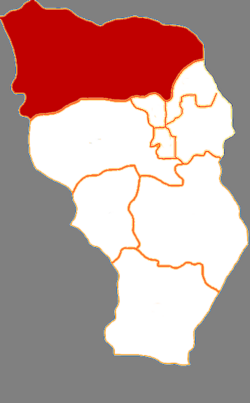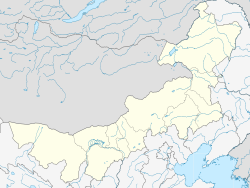Wuchuan County, Inner Mongolia
Wuchuan County
武川县 • ᠦᠴᠤᠸᠠᠨ ᠰᠢᠶᠠᠨ Wuchwan, Wu-ch'uan | |
|---|---|
 One of the main corners of downtown Wuchuan | |
 Wuchuan in Hohhot | |
| Coordinates: 41°05′38″N 111°27′07″E / 41.09389°N 111.45194°E / 41.09389; 111.45194 | |
| Country | China |
| Autonomous region | Inner Mongolia |
| Prefecture-level city | Hohhot |
| County seat | Hoh Ereg |
| Area | |
| • Total | 4,885 km2 (1,886 sq mi) |
| Population (2020)[1] | |
| • Total | 95,869 |
| • Density | 20/km2 (51/sq mi) |
| • Major nationalities | Han Chinese Mongolian |
| Time zone | UTC+8 (China Standard) |
| Website | www.wuchuan.gov.cn |
| Wuchuan County, Inner Mongolia | |||||||
|---|---|---|---|---|---|---|---|
| Chinese name | |||||||
| Simplified Chinese | 武川县 | ||||||
| Traditional Chinese | 武川縣 | ||||||
| |||||||
| Mongolian name | |||||||
| Mongolian Cyrillic | Үчуань шянь | ||||||
| Mongolian script | ᠦᠴᠤᠸᠠᠨ ᠰᠢᠶᠠᠨ | ||||||
| |||||||
Wuchuan (Mongolian: ᠦᠴᠤᠸᠠᠨ ᠰᠢᠶᠠᠨ; Chinese: 武川县), is a county of Inner Mongolia Autonomous Region, North China, it is under the administration of the prefecture-level city of Hohhot, the capital of Inner Mongolia. Wuchuan has an area of 4,885 km2 (1,886 sq mi) with a population of 95,869. It is connected to Hohhot by the Huwu Highway; roughly a half-hour's drive. Zhaohe Grasslands, a popular tourist site, is nearby.
Ancient history

According to the earliest records, the name Wuchuan comes from the Book of Zhou, dating from 398 AD, and the History of the Northern Dynasties. Human activity can be traced back as far as 10,000 years.
The archaeological site at Daqingshan (大青山) village includes many artefacts from the Dayao Culture (大窑文化) and proves that the area was suitable for human habitation at that time. Another Paleolithic site at Erdaowa (二道洼) Village has an estimated age of 10,000 years. Many stone tools were found there, including knives, cutters and axes, indicating that the occupants of the area were hunter-gatherers.
A more recent site from 5000 BC was found at Jinergou (井儿沟). Better stone tools and pottery were unearthed. The tools were of types used for building, harvesting and making clothes, proving that agriculture was already well established at that time.
In the Three Sovereigns and Five Emperors period, about 2800BC, many tribes settled at Wuchuan. These included the Xunyu, Shefang (舌方), Tufang (土方) and Guifang. The Yellow Emperor's war against Yunzhou was recorded in the Records of the Grand Historian by Sima Qian. During the Shang and Zhou dynasties, King Wu of Zhou fought against the Guifang tribe many times, finally winning the battle after 3 years; an event which is recorded in the I Ching.
Around 302 BC, Wuchuan belonged to the State of Zhao, one of the Warring States. The king of Zhao defeated Hulinloufan and built a wall near Daqing Mountain to stop the advance of the northern tribes. This event was recorded in the Commentary on the Water Classic. The wall is now called the South Daqing Mountain Great Wall. Wuchuan also plays a role in the history of the Qin dynasty and the Han dynasty, especially the Battle of Changping of Zhao Kuo. During this time, Wuchuan was controlled by the Xiongnu, a nomadic people famous for their bronzes and animal carvings. A Xiongnu dagger together with some knife-shaped coins from the State of Yan were unearthed at Tuchenzi Village, indicating that cultural exchanges between the Xiongnu and the Han Chinese were very extensive at that time. A total of more than 20 ancient tombs of the Qin and Han period have also been discovered in Wuchuan.
Later, Wuchuan was one of the capitals of the Southern and Northern dynasties. A tomb was found at Tuchenliang village, containing ancient coins, weapons, and many other bronze and iron artefacts. A Roman gold seal was unearthed at Touhao village and some Persian silver coins from the Sassanid dynasty were discovered at Baidao Cheng village. This indicates that during the period of the Northern Wei, Sui and Tang dynasties, a northern silk road existed, stretching from Xi'an to Datong to Huhhot and crossing Daqing Mountain to Wuchuan, eventually reaching the Middle East and finally Rome.
In 916, Wuchuan belonged to the state of Khitan. Archeological sites have also been found from the Yuan, Liao and Jin states. Some Song dynasty coins were also unearthed. In addition, eight ancient tombs and seven ruins of towns from that period were discovered around the area of Dongtucheng along the river Qiangpan.
Administrative divisions
Wuchuan County is made up of 3 towns and 6 townships.
| Name | Simplified Chinese | Hanyu Pinyin | Mongolian (Hudum Script) | Mongolian (Cyrillic) | Administrative division code |
|---|---|---|---|---|---|
| Towns | |||||
| Hoh Ereg Town | 可可以力更镇 | Kěkěyǐlìgēng Zhèn | ᠬᠥᠬᠡ ᠡᠷᠭᠢ ᠪᠠᠯᠭᠠᠰᠤ | Хөх эргэ балгас | 150125100 |
| Harul Town | 哈乐镇 | Hālè Zhèn | ᠬᠠᠷᠠᠭᠤᠯ ᠪᠠᠯᠭᠠᠰᠤ | Харуул балгас | 150125101 |
| West Ulan Bulag Town | 西乌兰不浪镇 | Xīwūlánbùlàng Zhèn | ᠪᠠᠷᠠᠭᠤᠨ ᠤᠯᠠᠭᠠᠨᠪᠤᠯᠠᠭ ᠪᠠᠯᠭᠠᠰᠤ | Баруун улаанбулаг балгас | 150125102 |
| Townships | |||||
| Daqingshan Township | 大青山乡 | Dàqīngshān Xiāng | ᠳ᠋ᠠ ᠴᠢᠩ ᠱᠠᠨ ᠰᠢᠶᠠᠩ | Да чин шин шиян | 150125200 |
| Upper Tohoi Township | 上秃亥乡 | Shàngtūhài Xiāng | ᠳᠡᠭᠡᠷᠡ ᠲᠣᠬᠣᠢ ᠰᠢᠶᠠᠩ | Дээр духай шиян | 150125205 |
| Deshenggou Township | 得胜沟乡 | Déshènggōu Xiāng | ᠳ᠋ᠧ ᠱᠧᠩ ᠭᠧᠦ ᠰᠢᠶᠠᠩ | Те шен гүү шиян | 150125207 |
| Erfenzi Township | 二份子乡 | Èrfènzi Xiāng | ᠡᠯ ᠹᠧᠨ ᠽᠢ ᠰᠢᠶᠠᠩ | Эл фен зи шиян | 150125211 |
| Har Huxu Township | 哈拉合少乡 | Hālāhéshǎo Xiāng | ᠬᠠᠷᠠᠬᠤᠰᠢᠭᠤ ᠰᠢᠶᠠᠩ | Хархошуу шиян | 150125213 |
| Holoi Mountain Township | 耗赖山乡 | Hàolàishān Xiāng | ᠬᠣᠭᠣᠯᠠᠢ ᠠᠭᠤᠯᠠ ᠰᠢᠶᠠᠩ | Хоолой уул шиян | 150125214 |
- Others:
- Inner Mongolia Wuchuan Economic Development Zone (内蒙古武川经济开发区, ᠥᠪᠥᠷ
ᠮᠣᠩᠭᠣᠯ ᠤᠨ
ᠦᠴᠤᠸᠠᠨ ᠤ
ᠠᠵᠤ ᠠᠬᠤᠢ ᠶᠢᠨ
ᠨᠡᠭᠡᠭᠡᠯᠲᠡ ᠶᠢᠨ ᠣᠷᠣᠨ) - Wuchuan Golden Triangle Economic Development Zone (武川金三角经济开发区, ᠦᠴᠤᠸᠠᠨ
ᠰᠢᠶᠠᠨ ᠤ
ᠠᠯᠲᠠᠨ
ᠭᠤᠷᠪᠠᠯᠵᠢᠨ
ᠨᠡᠭᠡᠭᠡᠯᠲᠡ ᠶᠢᠨ
ᠣᠷᠣᠨ)
- Inner Mongolia Wuchuan Economic Development Zone (内蒙古武川经济开发区, ᠥᠪᠥᠷ
Climate
| Climate data for Wuchuan (1991–2020 normals, extremes 1981–2010) | |||||||||||||
|---|---|---|---|---|---|---|---|---|---|---|---|---|---|
| Month | Jan | Feb | Mar | Apr | May | Jun | Jul | Aug | Sep | Oct | Nov | Dec | Year |
| Record high °C (°F) | 9.7 (49.5) |
12.9 (55.2) |
21.6 (70.9) |
28.4 (83.1) |
31.0 (87.8) |
36.2 (97.2) |
34.9 (94.8) |
32.1 (89.8) |
30.4 (86.7) |
23.9 (75.0) |
16.5 (61.7) |
11.4 (52.5) |
36.2 (97.2) |
| Mean daily maximum °C (°F) | −6.5 (20.3) |
−2.3 (27.9) |
4.5 (40.1) |
12.7 (54.9) |
19.1 (66.4) |
23.7 (74.7) |
25.5 (77.9) |
23.7 (74.7) |
18.5 (65.3) |
11.2 (52.2) |
2.2 (36.0) |
−5.0 (23.0) |
10.6 (51.1) |
| Daily mean °C (°F) | −14.0 (6.8) |
−9.7 (14.5) |
−2.5 (27.5) |
5.9 (42.6) |
12.6 (54.7) |
17.5 (63.5) |
19.7 (67.5) |
17.7 (63.9) |
12.1 (53.8) |
4.5 (40.1) |
−4.4 (24.1) |
−11.8 (10.8) |
4.0 (39.2) |
| Mean daily minimum °C (°F) | −19.5 (−3.1) |
−15.6 (3.9) |
−8.5 (16.7) |
−0.8 (30.6) |
5.6 (42.1) |
11.1 (52.0) |
14.0 (57.2) |
12.1 (53.8) |
6.4 (43.5) |
−1.0 (30.2) |
−9.5 (14.9) |
−17 (1) |
−1.9 (28.6) |
| Record low °C (°F) | −32.6 (−26.7) |
−32.5 (−26.5) |
−26.3 (−15.3) |
−17.4 (0.7) |
−9.8 (14.4) |
−0.4 (31.3) |
4.7 (40.5) |
1.2 (34.2) |
−6.5 (20.3) |
−15.3 (4.5) |
−30.6 (−23.1) |
−33.6 (−28.5) |
−33.6 (−28.5) |
| Average precipitation mm (inches) | 2.1 (0.08) |
3.3 (0.13) |
7.3 (0.29) |
14.3 (0.56) |
30.4 (1.20) |
48.5 (1.91) |
96.5 (3.80) |
75.3 (2.96) |
46.4 (1.83) |
19.4 (0.76) |
6.8 (0.27) |
2.6 (0.10) |
352.9 (13.89) |
| Average precipitation days (≥ 0.1 mm) | 4.1 | 4.2 | 5.0 | 4.7 | 7.3 | 11.2 | 13.7 | 11.6 | 9.2 | 4.8 | 4.6 | 4.4 | 84.8 |
| Average snowy days | 7.0 | 6.7 | 7.0 | 3.7 | 1.4 | 0.1 | 0 | 0 | 0.3 | 2.9 | 6.5 | 7.9 | 43.5 |
| Average relative humidity (%) | 59 | 52 | 44 | 37 | 39 | 49 | 60 | 64 | 60 | 55 | 56 | 59 | 53 |
| Mean monthly sunshine hours | 216.5 | 215.5 | 257.9 | 275.1 | 293.1 | 266.6 | 262.8 | 262.5 | 239.7 | 242.5 | 207.0 | 199.1 | 2,938.3 |
| Percent possible sunshine | 73 | 71 | 69 | 68 | 65 | 59 | 58 | 62 | 65 | 72 | 71 | 70 | 67 |
| Source: China Meteorological Administration[2][3] | |||||||||||||
References
- ^ Inner Mongolia: Prefectures, Cities, Districts and Counties
- ^ 中国气象数据网 – WeatherBk Data (in Simplified Chinese). China Meteorological Administration. Retrieved 10 October 2023.
- ^ 中国气象数据网 (in Simplified Chinese). China Meteorological Administration. Retrieved 10 October 2023.

